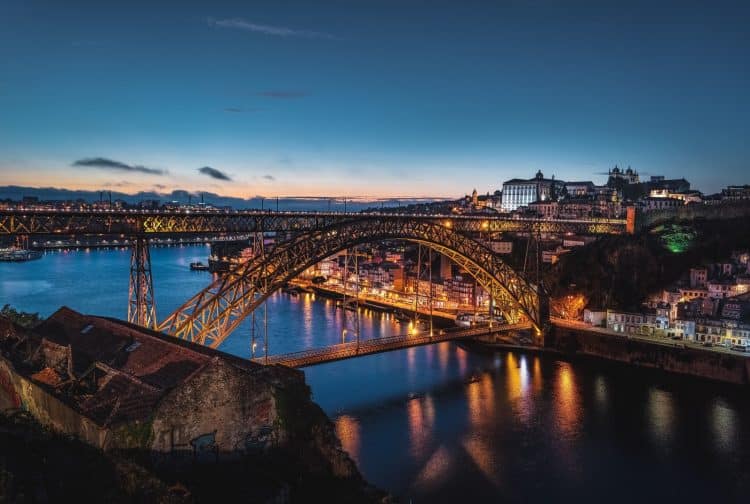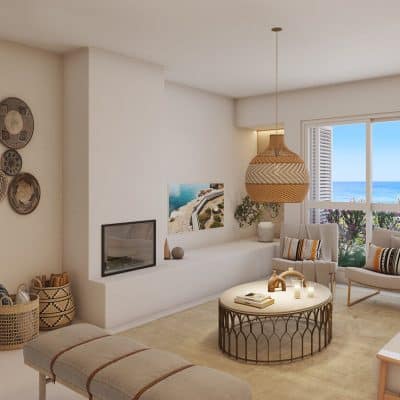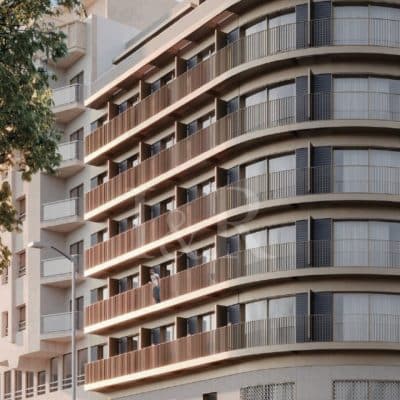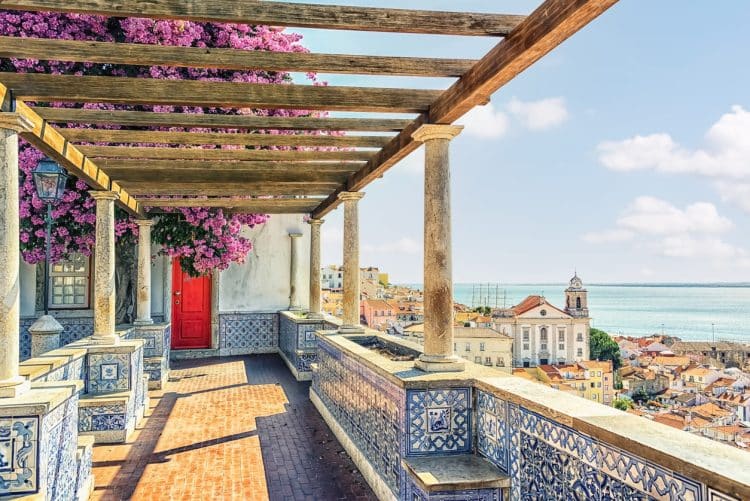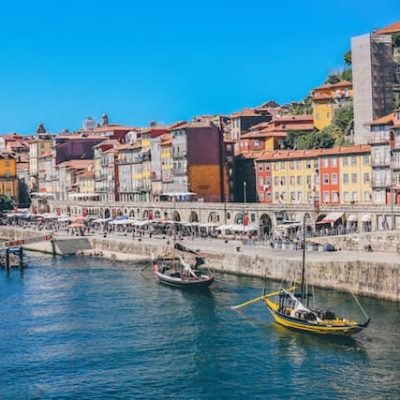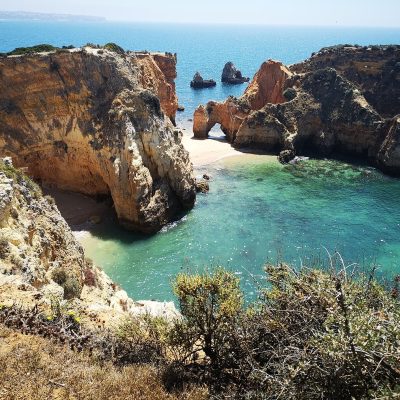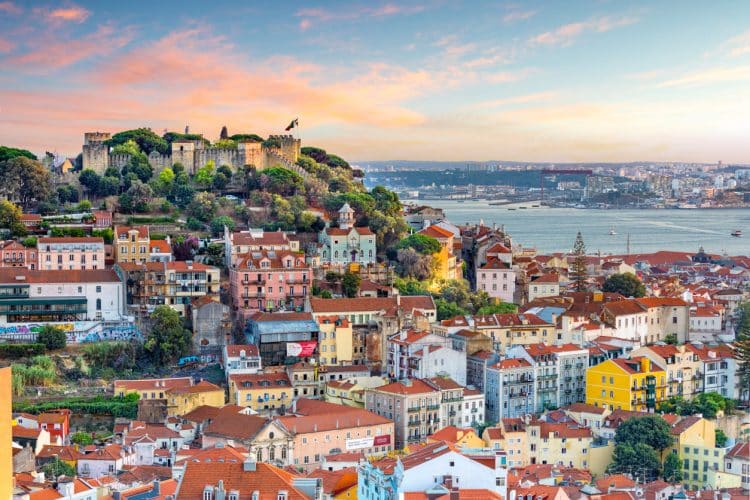Portugal in numbers
- Continent: Europe
- Population: 10,249,631 inhabitants (2023)
- Population growth: -0.12%/year
- Area: 92,226 km²
- Density: 111.58 inhabitants / km²
- GDP growth: 2.4% / year (2023)
- Official language: Portuguese
- Currency: Euro (€ EUR)
- Type of State: Republic
- Tourists: 15,100,000 people/year (2021)
Portugal, the westernmost country of continental Europe!
Portugal is a country in Southern Europe located on the west of the Iberian Peninsula. To its north and east is Spain, which makes up the rest of the Peninsula, and to the west is the Atlantic Ocean. A member of the European Union, it is the westernmost country in continental Europe. It also includes the archipelagos of the Azores and Madeira, which are located in the Atlantic Ocean.
Portugal became a member of the EU in 1986 and now enjoys a standard of living similar to other members of the EU. With the help of European subsidies, it has embarked on a series of infrastructure projects, some of them considered to be quite ambitious, including many highways and the Vasco de Gama bridge over the Tagus river that flows through Lisbon, which is eleven miles long and is the longest bridge in Europe.
Highly integrated into the world economy, it suffers from the same ills as its European partners, in particular a lack of economic competitiveness, and a demographic slowdown due to mass emigration and the accelerated aging of his population.
It is an attractive destination for tourists, with services and tourism accounting for around 10% of GDP.
Our selection in this country
A stable country, with lower property prices and an attractive taxation proposition
Portugal offers a number of attractions for investors:
- A stable democratic government
- A cost of living among the lowest in the EU
- An efficient health system
- The European currency
- No significant financial risk with the exchange rate and interest rates being set by the European Central Bank
- A transparent legal system for property transactions
- Advantageous taxation: absence of inheritance tax and donations for residents in Portugal, special exemption or reduced income tax regime for non-habitual residents
- An attractive taxation system for people retiring to Portugal
- Attractive investment opportunities. A holiday destination with a strong tourist appeal and therefore an active rental market with good demand for second homes,
- Good potential for commercial investment
All of these are positive points to be taken into consideration when choosing Portugal as a place for your main or secondary residence, or for pure investment purposes.
Real estate investment areas
The Lisbon region
- infrastructure: Lisbon international airport, fast rail links
- culture, tourism, well-being, gastronomy, climate
- 4 million tourists/year
- low cost of living
The Porto region
- culture, gastronomy, history, well-being
- very safe and pleasant city to live in
- very popular tourist destination along with the Duero region
The real estate market in Portugal
- Due to its membership of the EU, a part of the euro zone and having a stable investment environment, Portugal is particularly attractive to foreign investors with property prices being notably lower than in many other EU countries.
- There are good investment opportunities with newbuild properties.
- A growing demand for resale properties since 2021
- A recognised quality of construction
- A lower risk of a reduction in property prices over the long term given the lower investment cost
- Legislation that secures property ownership
Real estate prices in Portugal in 2022 / 2023
The price of real estate compared to that of France or the UK is very attractive
The price of real estate is in many areas at least half the price of property in France and the UK.
A fundamental trend emerges from the current market situation: due to the historical difficulties of obtaining a mortgage in the local market, an increasing number of local residents are obliged to rent properties, which underpins rental levels.
From an investment perspective, Portuguese property law currently favours landlords, since there is no security of tenure for tenants who fall into arrears. The changes in law have in particular made it possible to simplify and speed up eviction proceedings.
Lisbon residential properties are currently achieving average returns of between 5% and 10%.
With commercial property, it is not uncommon to see returns of up to 12%.
Registration of title
Legislation in Portugal makes it possible to secure your investment.
The cadastre system is well established and the market is strictly supervised, however outside the urban areas, one still needs to be careful to ensure that the proper planning approvals have been obtained.
Future of the Portuguese real estate market
The Portuguese real estate market is distinguished by a good quality of supply and relative price stability. In addition the law covering non-payment by tenants has been changed in favour of the landlord, so that rental agreements are more secure and profitable. It represents a solid investment option, particularly in the residential sector.
The Portuguese real estate market in a nutshell
There are great disparities between different parts of Portugal. In the Algarve the property value exceeds €3,000 euros/m² to while in Guarda in the Northeast of Portugal, the price is €690 euros/m². A large difference of more than 444%.
The big cities are surprisingly not the most expensive areas, especially Porto which remains at moderate average prices of 1,697 euros/m2, nearly half the price of property in the Algarve.
Steps to buy a property in Portugal
Step 1. Obtain a TIN number
The first step is to obtain a Portuguese tax number (NIF). You must provide proof of address and your passport to obtain the NIF number.
The NIF allows you to open a bank account with a local bank. You will need a local bank account to pay all fees incurred during the process.
Step 2. Arrange a bank loan
If you want to buy real estate in Portugal, you can take out a mortgage loan from a local bank. MHA-Invest has contacts with most banks in Portugal or abroad that are ready to set up mortgage loans for investors.
It is possible to obtain a mortgage for up to 25 years. Banks are currently prepared to finance between 60% and 70% of the purchase price.
The following documents are required to obtain a loan in Portugal:
- Copy of passport
- Portuguese tax identification number (NIF)
- Proof of income
- Bank statements for the last three months
- Proof of address (a recent utility bill – electricity or water)
- A statement of outstanding loans
- Proof of savings or investment accounts
- Commitment to purchase the property
- life insurance
Step 3. Signature of the Preliminary Contract (CPCV)
Both parties sign a preliminary contract called the Contrato de Promessa de Compra e Venda . This is the sales agreement in which all the terms and conditions of the purchase are specified.
Purchase price
At this stage, the investor is required to pay the Vendor a security deposit. This amount can represent between 5% to 10% of the purchase price and is often payable directly to the Vendor.
If the sale does not materialize because of an action of the seller, the latter is legally obliged to reimburse the Purchaser twice the value of the deposit.
Step 4. Deed of Sale
The Deed of Sale ( Escritura Publica de Compra e Venda ) is signed before a notary, who will register the property in the name of the purchaser.
The following taxes and charges are payable at the time of the deed of sale:
- IMT ( Imposto Municipal Sobre Transmissões ): This is the municipal property transfer tax and it is applicable to any real estate purchase in Portugal. It is calculated on the basis of the information present in the tax declaration and varies between 2% and 8% depending on the location and the type of property.
- Stamp duties ( Imposto do Selo ): This is a fixed rate of 0.8% of the purchase price
- All outstanding legal and professional fees and expenses
For a detailed breakdown of the costs and a detailed timeline of the investment, please contact us.
Portuguese Golden Visa
Portugal has been one of the most popular destinations in Europe offering an investment for visa scheme. For more details on this please contact us.
It should be noted however that the Portuguese government has decided to remove the issuance of visas linked to property investment

